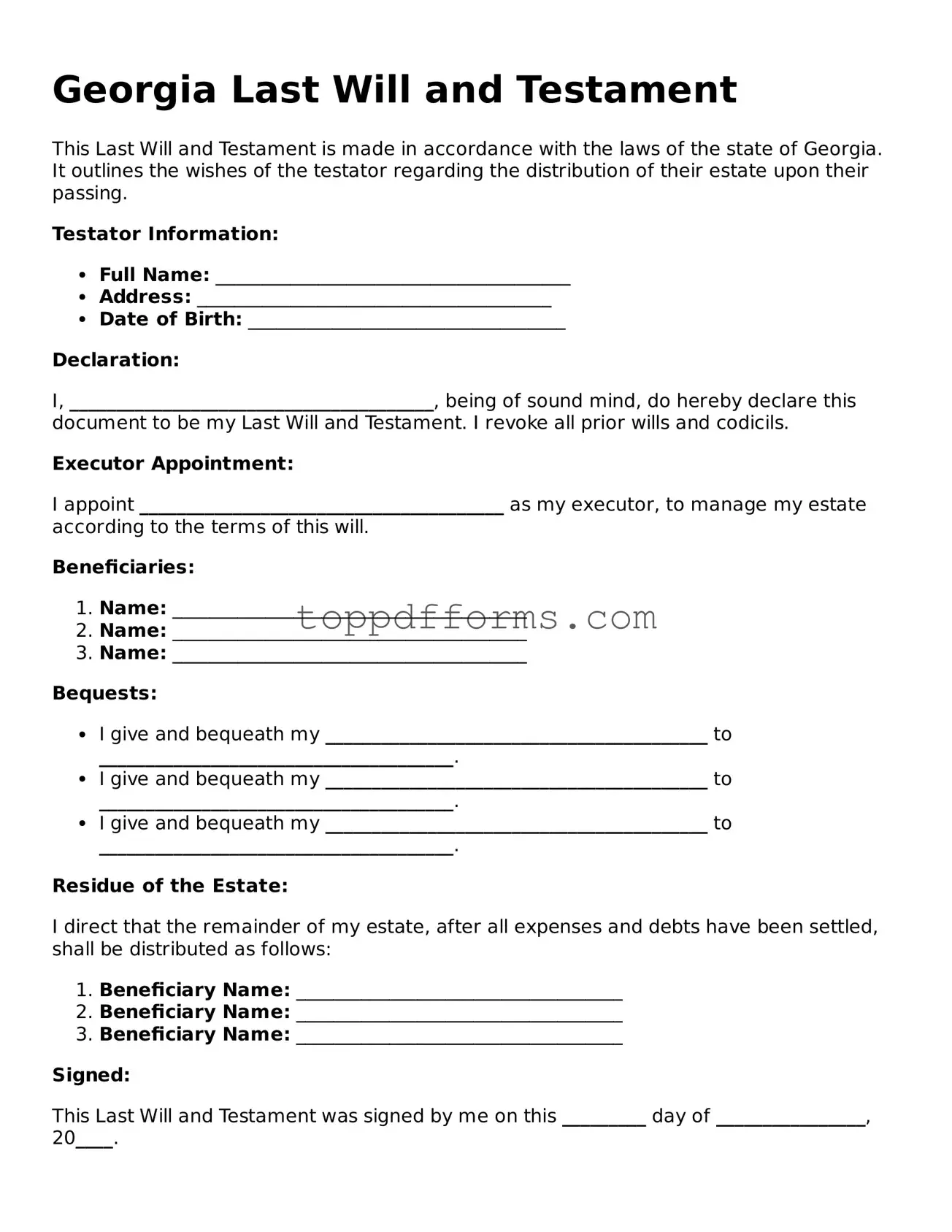Last Will and Testament Document for Georgia State
Things You Should Know About This Form
What is a Last Will and Testament in Georgia?
A Last Will and Testament is a legal document that outlines how a person's assets and affairs should be handled after their death. In Georgia, this document allows individuals to specify who will inherit their property, appoint guardians for minor children, and designate an executor to manage the estate. Creating a will ensures that your wishes are honored and can help prevent disputes among family members during a difficult time.
Who can create a Last Will and Testament in Georgia?
In Georgia, any individual who is at least 14 years old can create a Last Will and Testament, provided they are of sound mind. This means that the person must understand the nature of the document they are signing and the implications of their decisions. It is advisable, however, for adults to create their wills to ensure their wishes are clearly expressed and legally binding.
What are the requirements for a valid Last Will and Testament in Georgia?
For a will to be considered valid in Georgia, it must be in writing, signed by the testator (the person creating the will), and witnessed by at least two individuals. These witnesses must be at least 14 years old and cannot be beneficiaries of the will. While not required, it is often recommended to have the will notarized to further ensure its validity and to make the probate process smoother.
Can I change or revoke my Last Will and Testament in Georgia?
Yes, you can change or revoke your Last Will and Testament at any time while you are still alive and of sound mind. To make changes, you can create a new will that explicitly revokes the previous one or add a codicil, which is an amendment to the existing will. It is important to follow the same legal requirements for signing and witnessing when making changes to ensure that your new wishes are honored.
What happens if I die without a Last Will and Testament in Georgia?
If you pass away without a Last Will and Testament, your estate will be subject to Georgia's intestacy laws. This means that the state will determine how your assets are distributed, typically favoring your closest relatives, such as your spouse and children. Dying intestate can lead to outcomes that may not align with your wishes, so it is always advisable to create a will to ensure your preferences are respected.
PDF Overview
| Fact Name | Description |
|---|---|
| Governing Law | The Georgia Last Will and Testament is governed by the Official Code of Georgia Annotated (OCGA) § 53-4-1 et seq. |
| Age Requirement | In Georgia, you must be at least 14 years old to create a valid will. |
| Witness Requirement | Two witnesses are required to sign the will in the presence of the testator (the person making the will). |
| Revocation | A will can be revoked by creating a new will or by physically destroying the original document. |
| Self-Proving Wills | Georgia allows for self-proving wills, which can simplify the probate process. |
| Holographic Wills | Holographic wills, or handwritten wills, are recognized in Georgia if they are signed by the testator and show intent. |
Common mistakes
When completing the Georgia Last Will and Testament form, individuals often overlook critical details that can lead to complications later on. One common mistake is failing to properly identify beneficiaries. It is essential to include full names and, if possible, their relationship to the testator. Omitting this information can create confusion and potential disputes among family members.
Another frequent error involves not signing the document correctly. In Georgia, the will must be signed by the testator in the presence of at least two witnesses. If this requirement is not met, the will may be deemed invalid. It is important for the testator to ensure that the witnesses are not beneficiaries of the will, as this can also invalidate the document.
People also often neglect to update their wills after significant life events, such as marriage, divorce, or the birth of a child. Failing to revise the will can lead to unintended consequences, such as excluding new family members or unintentionally favoring someone who is no longer part of the testator's life. Regularly reviewing and updating the will is crucial to reflect current wishes.
Lastly, many individuals do not keep their wills in a secure yet accessible location. Storing the will in a safe deposit box without informing trusted family members can create challenges when it comes time to execute the will. It is advisable to discuss the location of the will with a trusted person, ensuring it can be easily found when needed.
Other Common State-specific Last Will and Testament Forms
Free Last Will and Testament Forms - Involves careful consideration of how assets will impact heirs.
For those looking to solidify their business framework, a critical resource is the comprehensive Operating Agreement for LLCs, which defines the roles and responsibilities of each member within the organization. Without this document, companies may face unforeseen challenges that arise from a lack of defined operating procedures. To learn more, visit comprehensive Operating Agreement guidelines.
Free Online Will Michigan - A method to designate guardians for minor children.
Will in Testament - Serves to ensure that an individual's wishes regarding their estate are honored.
